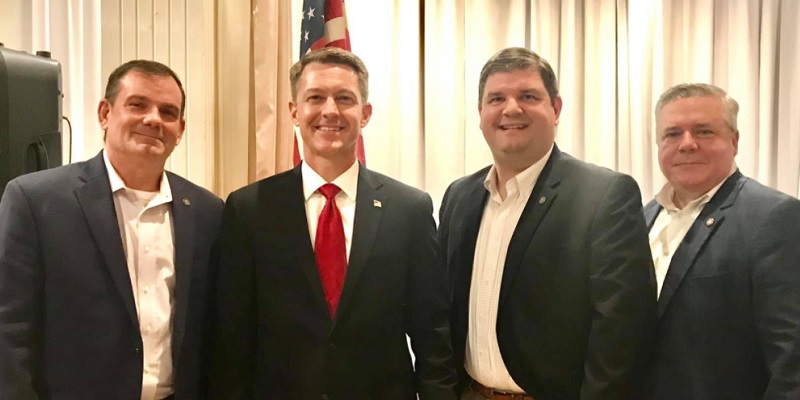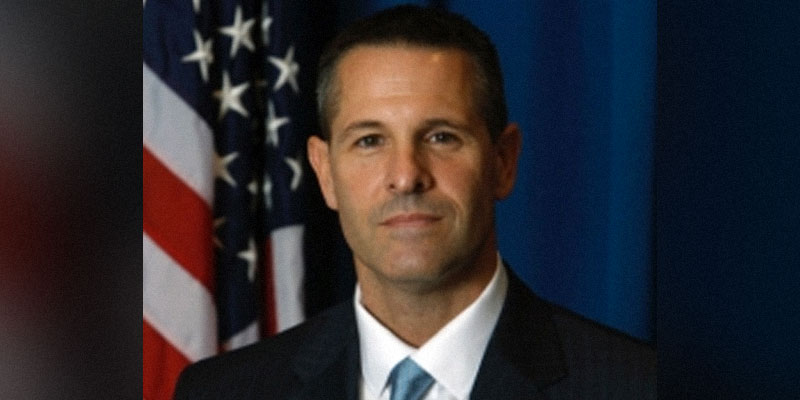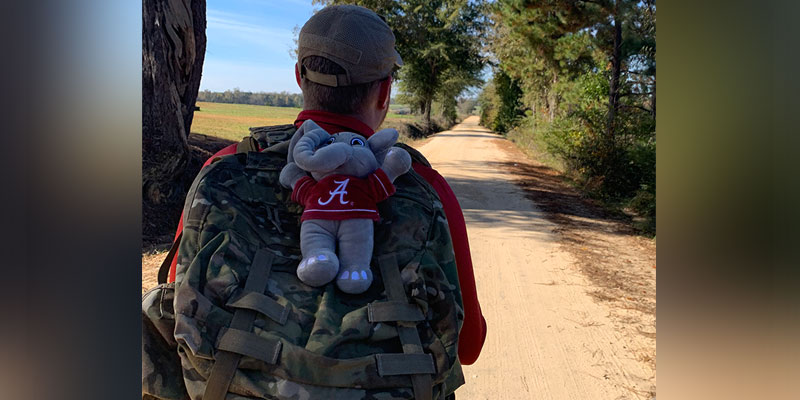MONTGOMERY — Sources close to the investigations have confirmed to Yellowhammer News that LEO Technologies’ proprietary Verus Analytical System helped lead to the respective recoveries of both the remains of Kamille “Cupcake” McKinney and Aniah Blanchard.
Remains believed to be Blanchard’s were recovered on Monday, as reported by Yellowhammer News. McKinney’s remains were recovered last month. Both were the subjects of separate Alabama missing persons cases, which now seem set to be prosecuted as kidnapping and homicide cases. Blanchard, a 19-year-old Homewood resident, had been attending school at Lee County’s Southern Union Community College; McKinney, 3, lived in Birmingham.
Three suspects have now been arrested and charged by the Auburn Police Department in relation to Blanchard’s disappearance: first Ibraheem Yazeed, then Antwain Shamar “Squirmy” Fisher on Friday night and finally David Johnson, Jr. on Monday.
While previous media reporting has advised that Fisher allegedly “disposed of evidence and provided transportation for Yazeed,” how authorities learned of Fisher’s reported involvement has remained a public mystery — until now.
What is LEO Technologies?
Before delving into the two aforementioned cases, it is important to understand just exactly what LEO Technologies does.
Co-founded by Tuscaloosa native James Sexton, LEO Technologies specializes in bringing cutting edge software and hardware, along with world-class subject matter expertise, to law enforcement agencies, intelligence entities, correctional facilities and private sector partners. “OUR SOLUTIONS ARE BUILT FOR COPS BY COPS,” their website highlights.
The company, founded in 2016, was featured in a recent national ABC News story about its revolutionary artificial intelligence (AI) system, Verus, that transcribes participating prisons’ phone calls virtually instantaneously and alerts law enforcement to relevant information.
Using inmate phone calls, which are hosted by other companies on behalf of the prisons, Verus produces near real-time intelligence based on keywords and phrases selected by law enforcement. It automatically downloads, analyzes and transcribes all recorded inmate calls, proactively flagging them for review.
While legally mandated warnings play at the beginning of every inmate phone call stating that each call is being recorded and monitored, inmates — and individuals on the other end of the line — still disclose an incredible amount of information, from incriminating evidence important in criminal investigations to warnings that an inmate is in danger — whether through self-harm or threats from other inmates.
Respective prison phone providers across the country already offer transcription services, however, these are done manually — and normally after a specific, reactive request. No law enforcement agency has the manpower resources to transcribe or monitor every prison phone call. Simply put, this means information is out there across the country that could be used to save lives and reduce crime — yet that goldmine of data is sitting idly by, collecting digital dust as business as usual in the American corrections system nets the same old problems.
Verus, on the other hand, is automated and proactive. And corrections facilities or the relevant associated law enforcement agency do not even have to expend manpower to constantly monitor the results produced. LEO Technologies provides each entity that uses Verus with an expert, retired law enforcement officer, from some of the best agencies in America. This individual becomes embedded in that law enforcement entity, monitoring the Verus results, helping facilitate the most effective keyword and phrase usage and forwarding relevant information to the proper investigator.
More Alabama ties
Jefferson County, under then-Sheriff Mike Hale, was the national beta test subject for Verus. The county’s prison went online with the system first and is still utilizing it to this day.
Retired Los Angeles Police Department detective Joe Ferreira is LEO Technologies’ embed that has been working with Jefferson County. Ferreira has worked every division imaginable for LAPD: homicide, narcotics, gangs, vice, forgery.
Yellowhammer News spoke with David Thompson, the retired Jefferson County Sheriff’s Office unit commander who worked to implement Verus for the sheriff’s office.
He called Verus “a very valuable tool to help with several things.”
Thompson then listed gathering intelligence on criminal activity as one of these things, explaining, “[B]ecause even though inmates are in jail, [many] still either operate criminal enterprises or they try to stay in the loop about what’s going on on the outside.”
Next, he detailed Verus helps provide a wealth of information on contraband already in the facility and planned smuggling operations of contraband into the facility. These operations can be conducted through employees, contractors or visitors.
Third, Thompson outlined that Verus is an important tool in helping with mental health issues in the facility. The system can help identify, through keywords, inmates battling mental illnesses, including those who are risks for self-harm or suicide.
Similarly, Verus can be used to thwart planned assaults, homicides or riots in the jail, Thompson remarked.
Verus typically costs about $500,000 annually for a corrections facility of 1,000 inmates. In addition to the potentially life-saving — thus priceless — benefits he mentioned, Thompson noted how the system pays for itself.
“When you find those calls ahead of time and you prevent an inmate from killing themselves or killing another inmate, it potentially saves millions of dollars in legal fees and settlements,” he added.
‘Success stories’ galore
Thompson explained that Hale’s office initially was very willing to try the system to decrease violent crime.
“The biggest untapped source of intelligence is the jail,” he said, speaking in general terms. Thompson added that trying to use a prison phone company’s monitoring tools is like “trying to find a needle in a haystack.”
He continued to praise LEO Technologies’ software for its unparalleled effectiveness and efficiency.
Citing a litany of “success stories,” Thompson remarked, “The reality is law enforcement is here to help bring justice, and the information [revealed by Verus] allows you to close a lot of cases.”
He said this includes cases that law enforcement officers were not even actively investigating, rather Verus allowed them to “just stumble upon” evidence. Additionally, there are many high profile cases in recent years in Jefferson County that Verus did not receive public credit for helping close but were indeed some of these success stories.
Take this wild story originally reported by Carol Robinson, when LEO Technologies’ involvement went unheralded.
Thompson told ABC News about this example stemming from a Birmingham man who was arrested in 2017 on outstanding felony warrants. His car was towed to a local impound yard, and while he was in the Jefferson County jail, Verus alerted law enforcement officials to search his car for drugs.
“He calls family members and asks them to go to the tow yard, and get a locked camera case from his car,” Thompson said. “And he gives them the three-digit code to unlock the case.”
Law enforcement officers, once notified of the contents of that call, got a search warrant and rushed to the impound yard with a drug-sniffing K9.
“We sent our narcotics people to the tow yard and beat the family there,” Thompson explained. “We didn’t even have to break the case open because we had the code.”
Authorities reportedly recovered three grams of cocaine, two grams of heroin and an undetermined amount of the sedative alprazolam.
Without Verus, it would have been doubtful that law enforcement officials ever found out about the drugs. And, even with a slower, manual prison phone monitoring service, the man’s family members would have been able to beat authorities to the car and move the drugs.
This is just one of many positive results made possible by Verus in Jefferson County alone. Thompson said numerous illegal weapons and a large amount of drugs have been taken off the streets in the Birmingham metro area due to the technology.
Last year, an inmate call in Jefferson County even recorded a live murder outside the jail involving suspected gang members. Using intelligence from the call, local, state and federal authorities were able to launch a large-scale roundup called “Operation Focused Remedy” in and around Bessemer that sought targeted arrests on nine federal and 26 state warrants. Over 20 firearms were recovered from this operation.
Then there was the case of a Jefferson County inmate allegedly running a prostitution ring from inside his jail cell. Verus helped authorities bust the ring and rescue at least one human trafficking victim, Thompson told ABC News.
Another example obtained by Yellowhammer News pertains to ‘Two Gunz Vito,’ a local rapper who was indicted in 2017 for the murder of then Mayor-Elect Randall Woodfin’s nephew. The indictment was made possible because Vito, already an inmate, on a prison phone call provided a synopsis of the homicide that he allegedly committed. He was arrested and detained with an admissible confession in this high-profile case due to Verus, requiring no search warrant, phone tap, interview or law enforcement operation.
Indeed, information obtained by Yellowhammer News concluded that in 2018 alone, Verus helped the Jefferson County Sheriff’s Office screen over four million inmate calls. These calls resulted in a total of 118 criminal reports, including 39 homicides.
More jurisdictions starting to benefit
Jefferson County, however, is not an outlier in having success with Verus.
The East Metro Area Crime Center has also subsequently chosen to use the technology, and Oxford Police Chief Bill Partridge told ABC News “it made a believer out of me in the first week.”
In an interview with Yellowhammer News, Partridge, currently president of the Alabama Association of Chiefs of Police, shared personal experiences that mirrored the positive results that Thompson outlined.
Partridge stressed that the “biggest thing” that continues to strike him about Verus is helping prevent inmate suicides.
The police chief outlined that inmates, just as in the outside world, normally reach out to loved ones with a cry for help. Because this happens frequently via prison phone calls, law enforcement authorities are able to be alerted by Verus and act accordingly to potentially save a life.
“That alone is the most fantastic part about it,” Partridge said of preventing suicides.
He added that Verus “pays for itself with [suicide reductions] alone.”
“Now the rest of it is all gravy from there,” he further noted, mentioning lots of gravy at that — the same broad benefits outlined by Thompson.
“I think this technology is probably some of the best technology put out since the taser,” Partridge stressed, noting he has firsthand seen some “serious crimes” solved and multiple potential suicides prevented because of it.
These sentiments were echoed by Calhoun County Sheriff Matthew Wade, who is now utilizing Verus in his county jail.
“We have — almost daily — analysts (from LEO) send us something,” he shared.
Wade detailed one example of an inmate who on a call told someone to go get a gun he had stashed, revealing the location. Authorities were then able to recover this gun before the inmate’s contact could, allowing the inmate to be appropriately prosecuted.
The sheriff said several crimes have been solved in Calhoun County that occurred outside the jail walls but were talked about over the prison phones.
“Having this technology is paramount,” Wade emphasized, outlining that the difference between Verus and traditional prison phone company monitoring is night and day.
He called the traditional, non-Verus method “the least effective way” possible. Wade, like Thompson and Partridge, praised potential suicide preventions as a key result for his jurisdiction.
“Intelligence-led policing is the future,” Wade added.
McKinney, Blanchard cases
While Wade very well might be right, it would seem intelligence-led policing’s time is now, too.
Just take the McKinney and Blanchard cases as prime examples — crimes that occurred outside of jail walls and rocked entire communities, with waves being felt around the United States.
First, before McKinney’s abduction become national news, she was the talk of the Jefferson County jail.
Yellowhammer News has learned that Verus helped identify approximately 20 phone calls about McKinney from the night she went missing alone. The calls identified potential witnesses and suspects alike that were at that point unknown to authorities.
A source with direct knowledge confirmed that authorities were even able to firmly place Patrick Devone Stallworth, one of the now-charged suspects, purchasing candy because Verus alerted to the keyword “candy.” Additionally, authorities were alerted to a call about exactly how McKinney was lured away from the party from a Jefferson County jail phone call, confirming what on-scene witnesses said. The totality of the information from calls into and out of the jail helped lead to the recovery of her remains.
Verus’ involvement with the Blanchard case is perhaps even more striking.
At the time of her disappearance, no entity in Lee County or Montgomery County was utilizing LEO Technologies.
Approximately one week into the search for Blanchard, the Montgomery City Jail requested to begin using Verus. After approximately another week that it took for the respective prison phone company to comply and allow LEO Technologies the proper access, the results started almost immediately.
A source close to the investigation confirmed to Yellowhammer News that on November 10, Montgomery Police Department received a tip in reference to a truck possibly involved in the disappearance. The word truck was then added as a keyword into that jurisdiction’s Verus alert list, and the following day, the system alerted to a phone call with that keyword used several times that seemingly helped solve the case.
In that phone call, it is alleged that Fisher, who had been arrested on unrelated warrants the previous day and was an inmate at the time, was extensively talking to an individual outside the jail about Blanchard’s disappearance. In said phone call, Fisher was personally implicated as having involvement with the aftermath of Blanchard’s disappearance, including having been in her car. Fisher reportedly warned the individual not to call the police, although the individual wanted to. Another suspect was also allegedly implicated in this same phone call.
After Verus alerted to the phone call, LEO obtained a copy through the prison phone company and gave the copy to Auburn Police Department. This was the piece of evidence that led to Fisher, then back out of jail, being picked up by Auburn PD on November 22. Sources close to the investigation confirm that the call also ended up being crucial in locating and recovering Blanchard’s remains.
What else can LEO Technologies help solve?
While the apparent closure of these two high-profile cases are two more examples of crimes committed outside of prison walls being aided by Verus, Alabama especially has an ongoing crisis in its corrections facilities.
This past spring, the Department of Justice’s (DOJ) Civil Rights Division and the U.S. Attorney’s Offices for the Northern, Middle and Southern Districts of Alabama concluded that there is reasonable cause to believe that the conditions in Alabama’s prisons for men violate the Eighth Amendment of the U.S. Constitution — the prohibition against “cruel and unusual” punishment.
While public examples of the conditions — from prison violence to overcrowding and inadequate resources — have been reported on for years, Melissa Brown just this month published yet another tear-jerking account of Alabama inmates’ “horrid” experiences.
While some action has been taken on the state level in recent years, there is still clearly much to be done, especially to reduce inmate deaths.
“Alabama Dept. of corrections confirms 3 inmate deaths in 8 days.” That’s a headline from last month.
“2 inmates found dead in Alabama prisons.” That happened on Monday of this week.
These examples are the norm, not the exception.
However, while there is an acceptance by legislators and state officials that something must be done, there is still seemingly no consensus on what solution(s) should be implemented.
The governor has convened a study group to gather all of the relevant data and propose solutions. That group is set to hold its final meeting on January 12 ahead of the February 4 start of the 2020 regular session of the Alabama legislature.
State Sen. Cam Ward (R-Alabaster), viewed as the leading legislator on corrections and criminal justice reform, has explained that the prison problem is no “one bill, one solution” issue. He has emphasized the complexity of the crisis, as well as the necessarily multifaceted nature of any potential package of solutions.
Yet, lines are already being drawn by some. State Rep. Matt Simpson (R-Daphne), a career prosecutor before his election in 2018, on Friday argued against sentencing reform as a potential part-solution.
Governor Kay Ivey, for her part, will drive much of this conversation in 2020, just as she did on major bipartisan issues like the Rebuild Alabama Act last time around.
In an op-ed earlier this, she detailed the problems, some things done in recent years to start improving conditions and what more needs to be accomplished. As she wrote, Ivey wants “an Alabama solution” for what is surely an Alabama problem.
While potential proposals such as sentencing reform and new prison construction are sure to be political wedges, there may be one bipartisan, commonsense change to be made. As Jefferson County, the Metro Area Crime Center, Calhoun County and now Montgomery City Jail have witnessed firsthand (Talladega is also in the process of going online), LEO Technologies’ Verus system is making tangible positive impacts on the very worst issues that Alabama is facing in its prisons: suicide, violent inmate-on-inmate crime and contraband-related problems.
Alabama solutions for Alabama problems
Yellowhammer News spoke with LEO’s Sexton, who said the company has had conversations with the Alabama Department of Corrections and senior members of the governor’s staff, including chief of staff and former Congressman Jo Bonner. Conversations are ongoing between ADOC and LEO. The state has recognized and embraced the need first to address staffing shortages, and the company invites corrections to try out its technology as a complement to those efforts.
Sexton said, “Governor Kay Ivey has asked for Alabama solutions … for Alabama problems. I believe we have one, and I’m working through the proper channels to get it in front of her for consideration.”
“I’m an Alabama boy that was adopted by Alabama officials to solve Alabama problems (in Jefferson County and the subsequent partners),” he continued. “I love my state, and this is a hometown problem for me. I want Alabama to win every time.”
Sexton advised Yellowhammer News that LEO is offering 90-day trials for any Alabama law enforcement agency or corrections facility (or “bundle” of agencies/facilities like the Metro Area Crime Center) 700 beds or over that want to see the product work for themselves before making a long term commitment.
“We have past performance of dealing with every issue the state of Alabama has had,” he added.
He also stressed that this is a bipartisan measure. While Hale, a Republican, as sheriff in Jefferson County first brought LEO in mainly because of violent crime, now-Sheriff Mark Pettway, a Democrat, has been able to focus on different benefits through improving inmate welfare.
Sexton also addressed head-on one potential talking point of naysayers: privacy concerns with the system automatically monitoring inmate phone calls.
“An inmate phone call is a consensual phone call, and it has been upheld for the last 30 years that … anything you say on those calls is evidence,” he said. “That’s the beautiful part about our tool. Anything discussed on the inmate phone call is for the benefit of society. Well upheld.”
In fact, LEO has a major civil rights organization in its corner.
Don Baylor with the Southern Christian Leadership Conference (SCLC), the organization co-founded by Dr. Martin Luther King, Jr., praised LEO Technologies and Verus in an interview with Yellowhammer News. He said he was “so impressed with the technology they offer.”
“They’re so effective at saving lives,” Baylor extolled.
He noted the SCLC was heavily involved with prison reform efforts as well.
Baylor continued to explain that LEO has been a big help with what they are doing in that regard. He underlined that Sexton is a big believer in giving deserving inmates second chances and actively aids in inmate education and rehabilitation initiatives.
‘I think they’re losing out’
To all of the corrections facilities and law enforcement agencies not using Verus in Alabama right now, Baylor urged them to get on board.
“Once this technology is understood, all of the things that it can do, I think it could revolutionize some of the issues that we have,” Baylor said.
He was joined by all of the law enforcement officials Yellowhammer News spoke to in making this call-to-action.
Thompson said Verus is worth it “if you can prevent (just) one jail suicide.”
Partridge added of facilities and agencies not using Verus, “I think they’re losing out by not taking advantage of the technology — not only the crimes they could be solving with it but also preventing those inmate deaths.”
“We’re doing everything we can to keep people safe inside jail — and then get them out of jail,” Sexton summarized. “And isolate the bad actors.”
If all of the above testimonials are not enough, Ferreira, the veteran detective and California transplant now working as LEO’s embed in the Heart of Dixie, told Yellowhammer News that he would not be in Alabama spearheading Verus’ usage if it did not work.
“I equate the technology we have to fishing with a fish finder,” he said. “I believe in the product. I was offered several other jobs prior to choosing to come here after I retired. But I was so impressed with the product and how effective it is that I wanted to be a part of it. Because I’m still doing police work but doing it in a different form. If I didn’t believe in the product, I wouldn’t be here.”
Sean Ross is the editor of Yellowhammer News. You can follow him on Twitter @sean_yhn













